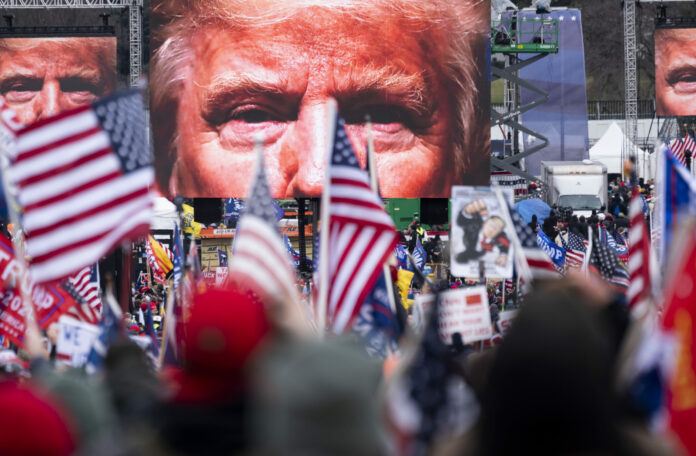An appellate court unanimously found on Friday that Donald Trump can face civil lawsuits over claims that he incited violence on Jan. 6, allowing cases to go forward while permitting Trump to re-raise immunity defenses down the line.
A three-judge panel of the D.C. Circuit Court of Appeals ruled that Trump’s actions before and during the Capitol insurrection were not eligible for the immunity which protects presidents from civil liability.
The panel limited their ruling somewhat, allowing Trump to raise his argument that he was acting as president on Jan. 6, and not as a private citizen, later on in the case.
But the ruling is a victory for plaintiffs in three separate cases seeking to hold Trump civilly accountable for egging on an angry mob to storm the Capitol on Jan. 6 in an effort to block Joe Biden from being certified as the winner of the 2020 election.
“When a first-term President opts to seek a second term, his campaign to win re-election is not an official presidential act,” Chief Judge Sri Srinivasan of the D.C. Circuit wrote in the opinion. “The Office of the Presidency as an institution is agnostic about who will occupy it next. And campaigning to gain that office is not an official act of the office.”
Later on, Srinivasan addressed the limits of the ruling, made by a panel composed of two Democrat appointees and one Republican appointee.
“Because our decision is not necessarily even the final word on the issue of presidential immunity, we of course express no view on the ultimate merits of the claims against President Trump,” he wrote.
The ruling addresses three separate lawsuits brought by members of Congress, by Capitol police officers, and others affected by the attack. In February 2022, U.S. District Judge Amit Mehta for the District of Columbia ruled that Trump’s claims of presidential immunity did not cover his conduct on Jan. 6, thereby allowing the suits to move forward.
Trump appealed that ruling, arguing to the D.C. Circuit that virtually all of his speech on any matter of public import as president fell within the “outer perimeter” of immunity from civil suit, per earlier Supreme Court precedents on the issue.
Srinivasan roundly rejected that argument.
“Rather, in his view, a President’s speech on matters of public concern is invariably an official function, and he was engaged in that function when he spoke at the January 6 rally and in the leadup to that day,” Srinivasan wrote. “We cannot accept that rationale. While Presidents are often exercising official responsibilities when they speak on matters of public concern, that is not always the case.”
The panel was clear that its ruling did not address “whether or when a President might be immune from criminal prosecution” and only applies to civil questions at the threshold stage of the suits. The decision also allows Trump to raise First Amendment concerns later on and to litigate executive privilege claims as they might apply to evidence brought in the case.
Trump, per the decision, could still bring his claim of official act immunity in a motion for summary judgment, once more evidence has been developed. To do that, Trump would have to prove that he was acting within his official capacity as president while delivering the speech at the Ellipse on Jan. 6.
Srinivasan left the door wide open to evidence eventually helping Trump on that point, and suggested that edge cases may be more deserving of immunity.
“Immunity cannot serve its intended purpose if it is withheld when a President would need it most — i.e., when a President might refrain from undertaking some course of official action because of uncertainty about whether it could give rise to damages liability,” the chief judge wrote.
At another point, Srinivasan put forth a hypothetical strikingly similar to the structure of the 2024 election, in which former President Trump is exceedingly likely to be the GOP nominee against President Joe Biden.
Srinivasan asked what would happen if full civil immunity from defamation was granted to current presidents, but denied to former presidents running against them.
“In that situation, one candidate, the former President, would face civil damages liability for statements on matters of public concern in campaign ads or in an acceptance speech at a party convention,” he wrote. “But the competing candidate, the sitting President, would be wholly insulated from damages liability for making the very same statements on the opposing side of the very same race.”
“We see no basis for giving an incumbent President that kind of asymmetrical advantage when running against his predecessor,” Srinivasan concluded.


